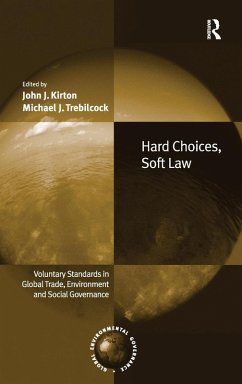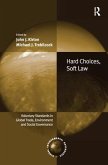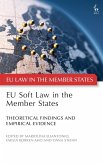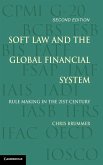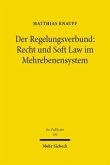John J. Kirton, Michael J. Trebilcock
Hard Choices, Soft Law
Voluntary Standards in Global Trade, Environment and Social Governance
John J. Kirton, Michael J. Trebilcock
Hard Choices, Soft Law
Voluntary Standards in Global Trade, Environment and Social Governance
- Gebundenes Buch
- Merkliste
- Auf die Merkliste
- Bewerten Bewerten
- Teilen
- Produkt teilen
- Produkterinnerung
- Produkterinnerung
An important read for academics and policy-makers alike, Hard Choices, Soft Law asserts that voluntary standards, or 'soft' law, are an important supplement to international law in a number of areas.
Andere Kunden interessierten sich auch für
![Hard Choices, Soft Law Hard Choices, Soft Law]() John J. KirtonHard Choices, Soft Law71,99 €
John J. KirtonHard Choices, Soft Law71,99 €![Tracing the Roles of Soft Law in Human Rights Tracing the Roles of Soft Law in Human Rights]() Stephanie LagoutteTracing the Roles of Soft Law in Human Rights150,99 €
Stephanie LagoutteTracing the Roles of Soft Law in Human Rights150,99 €![Soft Skills for the Effective Lawyer Soft Skills for the Effective Lawyer]() Randall KiserSoft Skills for the Effective Lawyer93,99 €
Randall KiserSoft Skills for the Effective Lawyer93,99 €![Non-State Actors, Soft Law and Protective Regimes Non-State Actors, Soft Law and Protective Regimes]() Non-State Actors, Soft Law and Protective Regimes100,99 €
Non-State Actors, Soft Law and Protective Regimes100,99 €![EU Soft Law in the Member States EU Soft Law in the Member States]() EU Soft Law in the Member States127,99 €
EU Soft Law in the Member States127,99 €![Soft Law and the Global Financial System Soft Law and the Global Financial System]() Christopher BrummerSoft Law and the Global Financial System94,99 €
Christopher BrummerSoft Law and the Global Financial System94,99 €![Der Regelungsverbund: Recht und Soft Law im Mehrebenensystem Der Regelungsverbund: Recht und Soft Law im Mehrebenensystem]() Matthias KnauffDer Regelungsverbund: Recht und Soft Law im Mehrebenensystem149,00 €
Matthias KnauffDer Regelungsverbund: Recht und Soft Law im Mehrebenensystem149,00 €-
-
-
An important read for academics and policy-makers alike, Hard Choices, Soft Law asserts that voluntary standards, or 'soft' law, are an important supplement to international law in a number of areas.
Produktdetails
- Produktdetails
- Verlag: Routledge
- Seitenzahl: 392
- Erscheinungstermin: 28. November 2004
- Englisch
- Abmessung: 240mm x 161mm x 26mm
- Gewicht: 752g
- ISBN-13: 9780754609667
- ISBN-10: 0754609669
- Artikelnr.: 42432479
- Herstellerkennzeichnung
- Libri GmbH
- Europaallee 1
- 36244 Bad Hersfeld
- gpsr@libri.de
- Verlag: Routledge
- Seitenzahl: 392
- Erscheinungstermin: 28. November 2004
- Englisch
- Abmessung: 240mm x 161mm x 26mm
- Gewicht: 752g
- ISBN-13: 9780754609667
- ISBN-10: 0754609669
- Artikelnr.: 42432479
- Herstellerkennzeichnung
- Libri GmbH
- Europaallee 1
- 36244 Bad Hersfeld
- gpsr@libri.de
John J. Kirton, Michael J. Trebilcock
Contents: Introduction: hard choices and soft law in sustainable global
governance, John J. Kirton and Michael J. Trebilcock. Setting Standards for
Sustainable Forestry: Nonstate global governance: is forest certification a
legitimate alternative to a global forest convention?, Steven Bernstein and
Benjamin Cashore; The Forest Stewardship Council: a developing country
perspective, Tasso Rezende de Azevedo; Indigenous rights and forest
certification in British Columbia, Chris Tollefson. Setting Standards for
Labour: Codes of corporate conduct and the labour regulatory state in
developing countries, Adelle Blackett; Standard setting at the
International Labour Organization: the case of precarious employment, Leah
F. Vosko; Hard law or soft law: India and international labour standards,
C.S. Venkata Ratnam and Anil Verma; Trade policy and labour standards:
objectives, instruments and institutions, Michael J. Trebilcock. Creating
Codes of Corporate Responsibility: Corporate social responsibility and the
evolution of international norms, Hevina S. Dashwood; The role of
nongovernmental organizations and social movements in developing countries,
John W. Foster; Multinational corporations, globalization and the challenge
of self-regulation, Wesley Cragg; Canadian corporate responsibility in
Sudan: why Canada backed down, Robert O. Matthews. International
Institutions and Soft Law: The World Trade Organization, the North American
Free Trade Agreement and the challenge of sustainable development, Thomas
A. Hockin; Integrating environment and labour into the World Trade
Organization, Roy MacLaren; The future of the world trading system: beyond
Doha, Sylvia Ostry; Enhancing global governance: corporate social
responsibility and the international trade and investment framework,
Christopher Wilkie; A corporate perspective on globalization, sustainable
development and soft law, Michael E. Cloghesy; Terminating agricultural
biotechnology? Hard law, voluntary measures and the life sciences industry,
Lisa N. Mills; Hard and soft law in international institutions:
complements, not alternatives, Nicholas Bayne; Bibliography; Index.
governance, John J. Kirton and Michael J. Trebilcock. Setting Standards for
Sustainable Forestry: Nonstate global governance: is forest certification a
legitimate alternative to a global forest convention?, Steven Bernstein and
Benjamin Cashore; The Forest Stewardship Council: a developing country
perspective, Tasso Rezende de Azevedo; Indigenous rights and forest
certification in British Columbia, Chris Tollefson. Setting Standards for
Labour: Codes of corporate conduct and the labour regulatory state in
developing countries, Adelle Blackett; Standard setting at the
International Labour Organization: the case of precarious employment, Leah
F. Vosko; Hard law or soft law: India and international labour standards,
C.S. Venkata Ratnam and Anil Verma; Trade policy and labour standards:
objectives, instruments and institutions, Michael J. Trebilcock. Creating
Codes of Corporate Responsibility: Corporate social responsibility and the
evolution of international norms, Hevina S. Dashwood; The role of
nongovernmental organizations and social movements in developing countries,
John W. Foster; Multinational corporations, globalization and the challenge
of self-regulation, Wesley Cragg; Canadian corporate responsibility in
Sudan: why Canada backed down, Robert O. Matthews. International
Institutions and Soft Law: The World Trade Organization, the North American
Free Trade Agreement and the challenge of sustainable development, Thomas
A. Hockin; Integrating environment and labour into the World Trade
Organization, Roy MacLaren; The future of the world trading system: beyond
Doha, Sylvia Ostry; Enhancing global governance: corporate social
responsibility and the international trade and investment framework,
Christopher Wilkie; A corporate perspective on globalization, sustainable
development and soft law, Michael E. Cloghesy; Terminating agricultural
biotechnology? Hard law, voluntary measures and the life sciences industry,
Lisa N. Mills; Hard and soft law in international institutions:
complements, not alternatives, Nicholas Bayne; Bibliography; Index.
Contents: Introduction: hard choices and soft law in sustainable global
governance, John J. Kirton and Michael J. Trebilcock. Setting Standards for
Sustainable Forestry: Nonstate global governance: is forest certification a
legitimate alternative to a global forest convention?, Steven Bernstein and
Benjamin Cashore; The Forest Stewardship Council: a developing country
perspective, Tasso Rezende de Azevedo; Indigenous rights and forest
certification in British Columbia, Chris Tollefson. Setting Standards for
Labour: Codes of corporate conduct and the labour regulatory state in
developing countries, Adelle Blackett; Standard setting at the
International Labour Organization: the case of precarious employment, Leah
F. Vosko; Hard law or soft law: India and international labour standards,
C.S. Venkata Ratnam and Anil Verma; Trade policy and labour standards:
objectives, instruments and institutions, Michael J. Trebilcock. Creating
Codes of Corporate Responsibility: Corporate social responsibility and the
evolution of international norms, Hevina S. Dashwood; The role of
nongovernmental organizations and social movements in developing countries,
John W. Foster; Multinational corporations, globalization and the challenge
of self-regulation, Wesley Cragg; Canadian corporate responsibility in
Sudan: why Canada backed down, Robert O. Matthews. International
Institutions and Soft Law: The World Trade Organization, the North American
Free Trade Agreement and the challenge of sustainable development, Thomas
A. Hockin; Integrating environment and labour into the World Trade
Organization, Roy MacLaren; The future of the world trading system: beyond
Doha, Sylvia Ostry; Enhancing global governance: corporate social
responsibility and the international trade and investment framework,
Christopher Wilkie; A corporate perspective on globalization, sustainable
development and soft law, Michael E. Cloghesy; Terminating agricultural
biotechnology? Hard law, voluntary measures and the life sciences industry,
Lisa N. Mills; Hard and soft law in international institutions:
complements, not alternatives, Nicholas Bayne; Bibliography; Index.
governance, John J. Kirton and Michael J. Trebilcock. Setting Standards for
Sustainable Forestry: Nonstate global governance: is forest certification a
legitimate alternative to a global forest convention?, Steven Bernstein and
Benjamin Cashore; The Forest Stewardship Council: a developing country
perspective, Tasso Rezende de Azevedo; Indigenous rights and forest
certification in British Columbia, Chris Tollefson. Setting Standards for
Labour: Codes of corporate conduct and the labour regulatory state in
developing countries, Adelle Blackett; Standard setting at the
International Labour Organization: the case of precarious employment, Leah
F. Vosko; Hard law or soft law: India and international labour standards,
C.S. Venkata Ratnam and Anil Verma; Trade policy and labour standards:
objectives, instruments and institutions, Michael J. Trebilcock. Creating
Codes of Corporate Responsibility: Corporate social responsibility and the
evolution of international norms, Hevina S. Dashwood; The role of
nongovernmental organizations and social movements in developing countries,
John W. Foster; Multinational corporations, globalization and the challenge
of self-regulation, Wesley Cragg; Canadian corporate responsibility in
Sudan: why Canada backed down, Robert O. Matthews. International
Institutions and Soft Law: The World Trade Organization, the North American
Free Trade Agreement and the challenge of sustainable development, Thomas
A. Hockin; Integrating environment and labour into the World Trade
Organization, Roy MacLaren; The future of the world trading system: beyond
Doha, Sylvia Ostry; Enhancing global governance: corporate social
responsibility and the international trade and investment framework,
Christopher Wilkie; A corporate perspective on globalization, sustainable
development and soft law, Michael E. Cloghesy; Terminating agricultural
biotechnology? Hard law, voluntary measures and the life sciences industry,
Lisa N. Mills; Hard and soft law in international institutions:
complements, not alternatives, Nicholas Bayne; Bibliography; Index.

